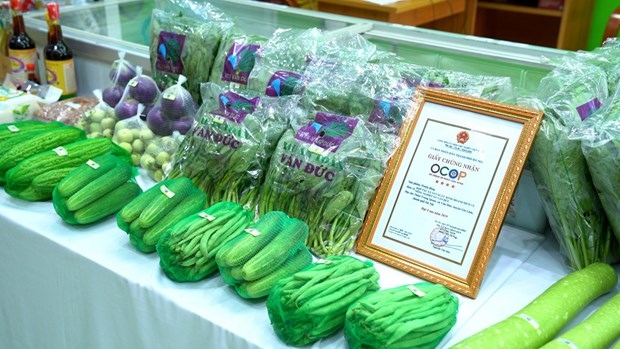Hanoi to host first livestream on OCOP products
The first-ever livestream promoting products of Hanoi’s “One Commune, One Product” (OCOP) programme will be held in the coming time, announced the organisers on June 2.
Organised by the Hanoi Coordination Office for New-style Rural Area Building together with the ASEAN Digital Conversion Research Institute (ASEAN Academy), the event aims to support stakeholders in the production, sale and marketing of OCOP products through digital technologies and e-commerce platforms, especially against the backdrop of COVID-19.
The three-hour livestream is slated for June 6, starting from 9am, and can be watched on the OCOP Live Facebook page and VTC Now.
It is hoped to motivate stakeholders in the programme in Hanoi and across the country at large to improve marketing skills and offer their products online via livestreaming, so as to reach more customers in the digital era.
The capital city is home to some 1,054 OCOP products.
Hanoi will open 40 more showrooms for goods from the local OCOP programme this year, making them more popular among domestic consumers and foreign visitors.
According to the municipal Department of Industry and Trade, products to be displayed include silk, confectionery, food, safe fruit and vegetable, and handicrafts.
They must be rated at least three-star and have been certificated as typical rural industrial products at the municipal and regional levels.
The Hanoi Department of Industry and Trade will organise five Vietnamese Goods Weeks in Hanoi this year to stimulate domestic demand and increase total retail sales, thereby helping businesses and farmers consume products.
Specifically, the five weeks will have a scale of about 100 standard booths each week.
Notably, Hanoi will support 50% of booth costs for participating units with a maximum of two booths per unit; similar support will be provided to each locality. In which, the city will pay attention to support localities and businesses of Hanoi and other localities in consuming agricultural products, aquatic products, and fruit, which face difficulties in consumption due to the impact of the COVID-19 pandemic.
At the same time, it will also strengthen communication and promotion, create the best conditions for businesses to reach consumers and expand the market.
In 2020, 14 OCOP showrooms were put into operation in the capital city. The city sped up necessary steps to verify and rate 370 more OCOP products in December to raise the total to 1,000 in the year.
Of the city’s recognised OCOP products, 421 have been rated four stars and 195 rated three stars while 14 are expected to earn five-star rankings.
The majority of the OCOP products (74.1%) are foods while souvenirs, furniture and décor products account for 18.3% of the total. The remainders are beverages, herbal medicine, fabrics and apparel.
The OCOP was initiated by the Ministry of Agriculture and Rural Development in 2008, based on Japan’s “One Village, One Product” and Thailand’s “One Town, One Product” programmes. It is an economic development programme for rural areas and focuses on increasing internal power and values, and is also to help with the national target programme on new-style rural area building.
Vietnam verified, rated, and recognised a total of 3,200 products as OCOP goods last year, 800 higher than planned, according to the Ministry of Agriculture and Rural Development.
The national OCOP council is reviewing 43 products for five-star ratings, the ministry said.
OCOP products are made from a combination of local resources, traditional culture, and advanced technology, which facilitates the development of diverse products with better quality and packaging, and the ability to trace product origin.
The programme has provided farmers with the chance to come together to form cooperatives, which now account for 38% of 1,400 OCOP producers nationwide.
The establishment of these cooperatives has allowed farmers to create products with better quality, design, and packaging as well as higher standards, and made products more relevant to market demand.

